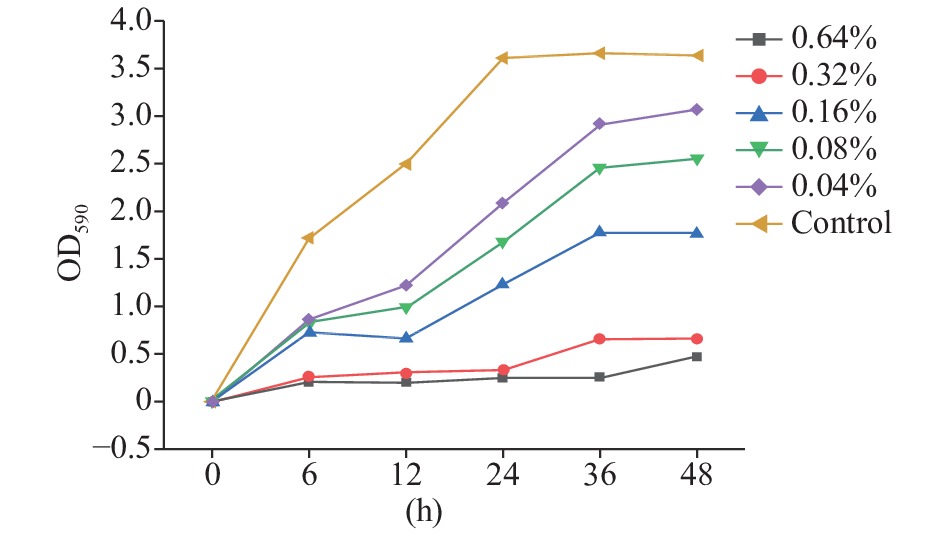| [1] |
M Otto. Community-associated MRSA: What makes them special?[J]. Int J Med Microbiol,2013,303(6-7):324−330. doi: 10.1016/j.ijmm.2013.02.007
|
| [2] |
Sahreena Lakhundi, Zhang Kunyan. Methicillin-resistant Staphylococcus aureus: Molecular characterization, evolution, and epidemiology[J]. Clinical microbiology reviews,2018,31(4).
|
| [3] |
Furukawa S, Kuchma S L, O'Toole G A. Keeping their options open: Acute versus persistent infections[J]. J Bacteriol,2006,188(4):1211−1217. doi: 10.1128/JB.188.4.1211-1217.2006
|
| [4] |
Holder D, Berry D, Dai D, et al. A dynamic and complex monochloramine stress response in Escherichia coli revealed by transcriptome analysis[J]. Water Res,2013,47(14):4978−4985. doi: 10.1016/j.watres.2013.05.041
|
| [5] |
Thien-Fah Mah. Biofilm-specific antibiotic resistance[J]. Future Microbiology,2012,7(9):1061−1072. doi: 10.2217/fmb.12.76
|
| [6] |
|
| [7] |
Ranall M V, Butler M S, Blaskovich M A, et al. Resolving biofilm infections: Current therapy and drug discovery strategies[J]. Curr Drug Targets,2012,13(11):1375−1385. doi: 10.2174/138945012803530251
|
| [8] |
Thomas Bjarnsholt, Ciofu Oana, Molin Søren, et al. Applying insights from biofilm biology to drug development−can a new approach be developed?[J]. Nature Reviews Drug Discovery,2013,12(10):791−808. doi: 10.1038/nrd4000
|
| [9] |
程峰, 尚若锋, 杨珍, 等. 茶树精油抗微生物作用机理研究进展[J]. 食品工业科技,2021,3(42):331−337.
|
| [10] |
Zhao Xingchen, Liu Zonghui, Liu Zuojia, et al. Phenotype and RNA-seq-Based transcriptome profiling of Staphylococcus aureus biofilms in response to tea tree oil[J]. Microbial Pathogenesis,2018:123304−123313.
|
| [11] |
Li Zhenbiao, Wang Nan, Wei Yingying, et al. Terpinen-4-ol enhances disease resistance of postharvest strawberry fruit more effectively than tea tree oil by activating the phenylpropanoid metabolism pathway[J]. Journal of Agricultural and Food Chemistry,2020,68(24):6739−6747. doi: 10.1021/acs.jafc.0c01840
|
| [12] |
Garozzo A, Timpanaro R, Stivala A, et al. Activity of Melaleuca alternifolia (tea tree) oil on influenza virus A/PR/8: Study on the mechanism of action[J]. Antiviral Research,2011,89(1):83−88. doi: 10.1016/j.antiviral.2010.11.010
|
| [13] |
James P J, Callander J T. Bioactivity of tea tree oil from Melaleuca alternifolia against sheep lice ( Bovicola ovis Schrank) in vitro[J]. Veterinary Parasitology,2012,187(3-4):498−504. doi: 10.1016/j.vetpar.2012.02.004
|
| [14] |
Yusaku Koseki, Tanaka Rika, Murata Hiroshi. Development of antibacterial denture cleaner for brushing containing tea tree and lemongrass essential oils[J]. Dental Materials Journal,2018,37(4):659−666. doi: 10.4012/dmj.2017-295
|
| [15] |
Srdjan Stepanovic, Vukovic Dragana, Hola Veronika, et al. Quantification of biofilm in microtiter plates: Overview of testing conditions and practical recommendations for assessment of biofilm production by staphylococci[J]. APMIS: Acta Pathologica, Microbiologica et Immunologica Scandinavica,2007,115(8):891−899. doi: 10.1111/j.1600-0463.2007.apm_630.x
|
| [16] |
官妍, 章九云, 汪长中, 等. 穿心莲内酯对表皮葡萄球菌生物被膜作用初探[J]. 中国中药杂志,2012,37(14):2147−2150.
|
| [17] |
Kelly C Rice, Ethan E Mann, Jennifer L Endres, et al. The cidA murein hydrolase regulator contributes to DNA release and biofilm development in Staphylococcus aureus[J]. Proceedings of the National Academy of Sciences of the United States of America,2007,104(19):8113−8118. doi: 10.1073/pnas.0610226104
|
| [18] |
Pankey G A, Sabath L D. Clinical relevance of bacteriostatic versus bactericidal mechanisms of action in the treatment of gram-positive bacterial infections[J]. Clin Infect Dis,2004,38(6):864−870. doi: 10.1086/381972
|
| [19] |
Hannah Mc Carthy, Rudkin Justine K, Black Nikki S, et al. Methicillin resistance and the biofilm phenotype in Staphylococcus aureus[J]. Frontiers in Cellular and Infection Microbiology,2015:5.
|
| [20] |
Das T, Sehar S, Koop L, et al. Influence of calcium in extracellular DNA mediated bacterial aggregation and biofilm formation[J]. PLoS One,2014,9(3):e91935. doi: 10.1371/journal.pone.0091935
|
| [21] |
Qin Zhiqiang, Ou Yuanzhu, Yang Liang, et al. Role of autolysin-mediated DNA release in biofilm formation of Staphylococcus epidermidis[J]. Microbiology,2007,153(7):2083−2092. doi: 10.1099/mic.0.2007/006031-0
|
| [22] |
Yao Yufeng, Vuong Cuong, Kocianova Stanislava, et al. Characterization of the Staphylococcus epidermidis accessory-gene regulator response: Quorum-sensing regulation of resistance to human innate host defense[J]. The Journal of infectious diseases,2006,193(6):841−848. doi: 10.1086/500246
|
| [23] |
Liu Meihui, Wu Xiaoxia, Li Jianke, et al. The specific anti-biofilm effect of gallic acid on Staphylococcus aureus by regulating the expression of the ica operon[J]. Food Control,2017:73613−618.
|
| [24] |
Adriana Renzoni, Barras Christine, François Patrice, et al. Transcriptomic and functional analysis of an autolysis-deficient, teicoplanin-resistant derivative of methicillin-resistant Staphylococcus aureus[J]. Antimicrobial Agents and Chemotherapy,2006,50(9):3048−3061. doi: 10.1128/AAC.00113-06
|
| [25] |
Valle J, Toledo Arana A, Berasain C, et al. SarA and not sigmaB is essential for biofilm development by Staphylococcus aureus[J]. Mol Microbiol,2003,48(4):1075−1087. doi: 10.1046/j.1365-2958.2003.03493.x
|











 DownLoad:
DownLoad: